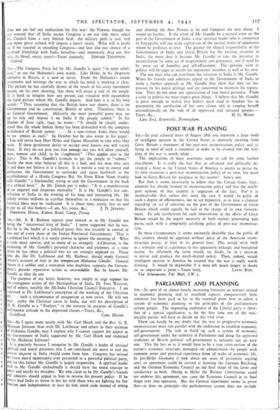POST-WAR PLANNING SIR,—In your editorial notes of August 28th you
represent a large body of intelligent opinion in the United States as anxiously awaiting from Great Britain a statement of her post-war reconstruction policy and as being in need of such a statement in order to be assured that the win- ning of the war is worth while.
The implications of these assertions seem to call for some further elucidation. Is it really the fact that so advanced and politically de- veloped a State as the United States of America is unable to devise by its own resources a post-war reconstruction policy of its own, but must look to Great Britain for guidance in this matter? Surely not.
But then it seems necessarily to follow that the United States Gov- ernment has already framed its reconstruction policy and that the intelli- gent opinion of that country is cognizant of the fact. For' it is inconceivable that unless this were the cast it would be guilty of such a degree of officiousness, not to say hypocrisy, as to raise a clamour regarding an act of omission on the part of the Government of Great Britain which could equally be laid to the charge of its own Govern- ment. Its sole justification for such intervention in the affairs of Great Britain would be the urgent necessity of both nations proceeding pari passu, each with a completely satisfying policy of post-war reconstruc- tion.
In these circumstances it seems eminently desirable that the public of this country should be apprised without delay of the American recon- struction policy, at least in its general lines. This would serve both as a stimulus and as a guidance to this apparently lethargic and benighted nation. So informed, the latter would, no doubt, be in a position to devise and produce the much-desired policy. Then, indeed, would intelligent opinion in America be assured that the war is really worth winning. It would be deplorable if it were left much longer in doubt
on so important a point.—Yours truly, Louis RIEU. The Athenaeum, Pall Mall, S.W. x.


























 Previous page
Previous page